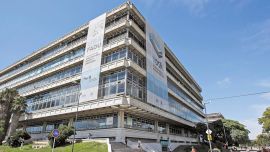President Alberto Fernández has opened up a new front, renewing his criticism of the Supreme Court just days after the Kirchnerite wing of his ruling coalition announced a rally calling for judicial reform.
Speaking Tuesday, the president affirmed that the nation’s highest tribunal has "very serious functional problems" and declared that "its credibility began to crumble" during the Mauricio Macri presidency.
The Peronist leader also referred to the case of Jujuy social leader Milagro Sala, the Kirchnerite activist who has been detained for almost six years.
"The truth is that I’m president and that I’d like to respect the institutions but I’m also a man who respects the rule of law and understands that the Judiciary is one of the three branches of government. Something’s working badly if Milagro Sala still remains under arrest," said Fernández in a radio interview.
The president recalled the Supreme Court reform of 2003 under the Néstor Kirchner government, pointing out: "We did not seek out justices close to us – Elena Highton [de Nolasco], [Ricardo] Lorenzetti, [Eugenio] Zaffaroni and Carmen Argibay,to accompany [Enrique] Petracchi and Carlos Fayt, who deserved all our respect."
"It seems to me that from the time Macri proposed sneaking two justices into the Supreme Court [Horacio Rosatti and Carlos Rosenkrantz, who were appointed by decree], its credibility began to crumble. When you look at how it works at present, the issue is very worrying," affirmed the president.
Despite these criticisms, Fernández avoided confirming whether he would be pushing a bill to reform the Supreme Court, also distancing himself from the possibility of the government impeaching any justice. Nevertheless, his declarations came after Deputy Justice Minister Juan Martín Mena offered his support to a protest from the Kirchnerite wing of the ruling Frente de Todos coalition called for February 1 outside the Supreme Court, affirming that “many people are fed up.”
Upon taking office, the Peronist leader vowed to embark upon judicial reform – a policy that opposition leaders allege is a step to promote impunity and protect Vice-President Cristina Fernández de Kirchner.
The president, however, separated his criticisms from the trials facing his vice-president, explaining: "What I have been proposing has nothing to do with Cristina. The Supreme Court never considered a single one of the 14 challenges presented by Cristina, never."
"When the courts function badly, they do not function badly for an ex- president or an ex-minister, they function badly for the citizenry. When you’re fired and sue, if the courts do not function well, you lose out. The judicial problem is very acute and we must take that on board so that things work as they should – as a service," added the president.
‘Worrying’
Escalating his criticism of the Supreme Court’s recent decisions, Fernández questioned a recent ruling declaring the law governing the Council of Magistrates to be unconstitutional and ordering its reform. The president described that decision as "incredible" and adding: "A first-year [law] student knows that a law which has been repealed can never regain its validity via a ruling. It needs another law [to be approved] to make it valid again."
In the framework of his criticisms of the Judiciary, Fernández pointed out that "the abuse made of remanding people in custody during the four years of the previous government is incredible” while aiming his fire against the use of "illegal association" charges in various cases, among them Sala.
"My position on Milagro Sala is well-known. This is a worrying issue from the way the trials have unfolded, according to many human rights organisations," pointed out the President.
In this sense, he indicated: "Some days ago, in one of those espionage cases in the federal courtrooms, the Federal Appeals Court rapidly removed the illegal association label from those involved, something which did not happen in the Macri years, which abused that charge incredibly."
"The most serious crime committed by Milagro Sala, according to the Jujuy courts, is fraudulent administration. The maximum sentence for that crime is six years so that you have to reach the conclusion that she has served her sentence. Why is she still in person? Because they added illegal association charges."
In this sense Fernández remarked: "By March the Supreme Court will have spent two years sitting on its Milagro Sala ruling."
The president also referred to the recent scandal related to a video leaked by the AFI intelligence regarding the alleged fabrication of legal cases against the former La Plata UOCRA construction workers’ leader Juan Pablo ‘Pata’ Medina.
"[AFI trustee] Cristina Caamaño informed that she had found this and sent it to me in writing. Then she showed me the video and I told her to denounce it," said the president in reference to former Buenos Aires Province Labour minister Marcelo Villegas being taped saying: "If I could have a Gestapo, a shock force to finish off the trade unions, I’d go ahead.”
Pushback
The remarks questioning the court received pushback from opposition leaders, among them Buenos Aires City Mayor Horacio Rodríguez Larreta, who considered them to be "very serious."
The PRO leader complained that Fernández was "endorsing" the attacks of different Kirchnerite sectors, who announced earlier this week that they would stage a February 1 march outside the Central Courthouse to press for changes in the nation’s highest tribunal.
Rodríguez Larreta was thus referring to both the presidential criticisms and to the support given by the deputy justice minister to the rally proposed by the picket leader Luis D'Elía "to throw out" all the Supreme Court justices.
"It seems to be very serious, the advances and attacks of the national government against the Supreme Court, very serious," pointed out the opposition leader.
"It seems very serious to me that national officials will be participating in a march demanding the resignation of the Supreme Court, it seems very serious to me," he repeated, warning that the Kirchnerite initiative impacts against "the basic principles of a republican system," affecting the separation of powers as established by the National Constitution.
Speaking at a press conference to announce new testing centres to detect coronavirus, the City Mayor lent his voice to opposition criticism, which considered that “a march promoted by top authorities of the Justice Ministry against the Supreme Court can only be ‘something good’ to feverish Kirchnerite minds, which find the separation of powers and independent courts totally unacceptable,” according to the words via Twitter of lower house Juntos por el Cambio caucus chief Mario Negri (Radical-Córdoba).
– TIMES/NA























Comments